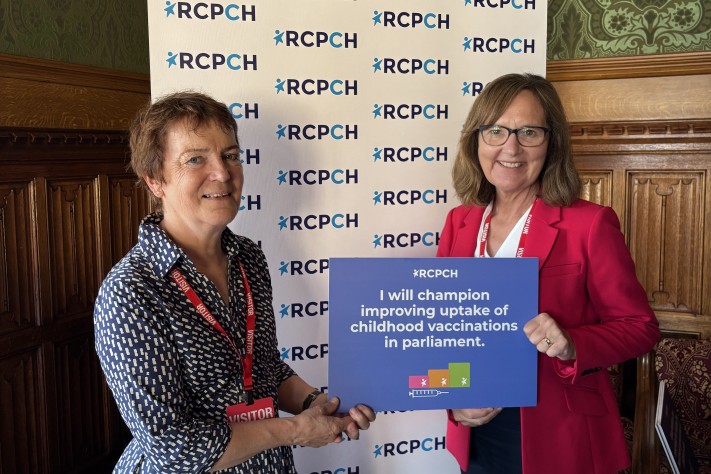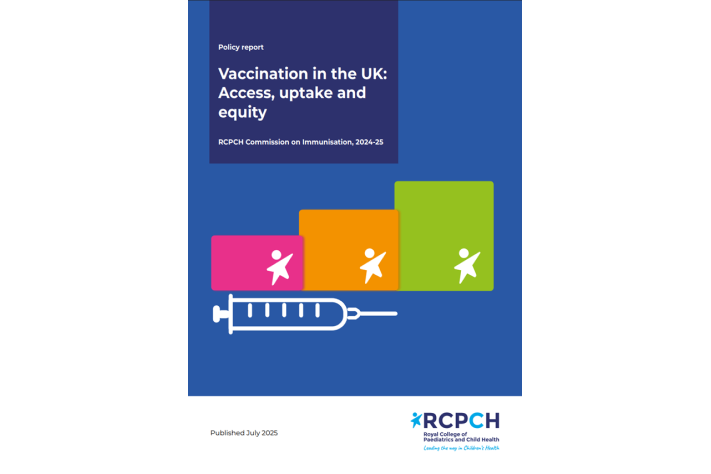1st July 2025
A report from the Royal College of Paediatrics and Child Health (RCPCH), being launched today in the House of Lords and attended by Alison Morton (iHV CEO), has highlighted the significant barriers and difficulties some parents face to get their child vaccinated from serious but preventable diseases and calls on governments to act now to prevent future outbreaks.

Professor Helen Bedford and Alison Morton at the House of Lords launch
The World Health Organization recommends a 95% vaccination rate to keep vulnerable groups, such as babies, the elderly, and those who are immunosuppressed, safe through herd immunity. Concerningly in the UK, not a single routine childhood vaccine has hit that target since 2021. Over the past few years, measles and whooping cough (pertussis) have seen a resurgence in the UK due to declining vaccination rates and waning immunity.
Concerned by this downward trend, RCPCH set up the Commission on Immunisation Access, Uptake and Equity and, over a 12-month period, examined national data and research, and gathered first-hand experiences from parents, healthcare workers, and children to understand what’s really preventing uptake.
The Commission concluded that the core challenges lie in logistical and systemic shortcomings and that the current system is fragmented, hard to navigate, and too often fails the very families who need it most. The Commission also found that research and public health resources are sometimes misdirected by focusing too heavily on vaccine hesitancy, when in fact there are many parents who want to vaccinate but simply can’t access services that work for them.
Alison Morton, CEO of the Institute for Health Visitors, said:
“Whilst most parents get their children vaccinated without hesitation, the widening inequalities and decline in vaccine uptake rates are a national cause for concern. This timely report presents a compelling case to ensure babies and children are protected against serious diseases that were once feared by families and can cause so much unnecessary harm.
“The good news is that there is lots of evidence on how to reverse the current trend – captured in the practical recommendations of this report. By working together across national government and local systems, we can tackle the systemic barriers that make it harder for some families to get the vaccines their children need. This includes investing in health visitors who remain parents’ first port of call for trusted advice and, with sufficient funding, are ideally placed to deliver vaccinations to vulnerable groups.”
The report highlights the critical role of the system in addressing access-related barriers, which can deter families, especially those with questions about vaccination, from seeking immunisation for their children. When asked about these obstacles parents reported:
- Difficulty booking appointments, especially ones that fit around work commitments and childcare needs
- Transport challenges, including inconvenient clinic locations and the high cost of public transit
- A lack of continuity in care, with many parents seeing a different GP or clinician at each visit. The absence of health visitors was especially significant, as it limited understanding of individual family circumstances that could influence vaccination decisions
- A lack of reminders from GP offices about upcoming vaccinations, parents and carers also reported having no easy way to determine what vaccines their children have and have not had, with no set digital records available.
- A fear of being judged for raising concerns about vaccines or having beliefs in alternative medicine.
The report also underscored the growing disparity in vaccine uptake among some ethnic minority groups, socioeconomically disadvantaged families and migrant communities. These groups reported specific challenges such as limited access to information due to language difficulties, digital exclusion, challenges in navigating the NHS, and a lack of targeted outreach.
In order to reverse declining vaccination rates, the UK must prioritise investments in infrastructure, digital health records for children, staffing levels and staff training. By addressing systemic barriers to access, including those which may more frequently affect underserved communities, the delivery and access to vaccinations can be improved for all.
The Institute of Health Visiting is working with NHS England on its plan to improve vaccination uptake through its Pathfinder project. The aim of the project is to improve access and uptake of childhood vaccinations in underserved groups. The Pathfinder project will test different models of enhanced health visiting provision across a mix of sites across England. The project’s recent call for expressions of interest attracted a huge amount of interest, with numerous submissions setting out a range of enhanced health visiting model options. These included vaccinations delivered during a home visit by a health visitor, vaccinations delivered by another registered healthcare professional who accompanies the health visitor on a targeted home visit, and community outreach approaches led by health visiting teams to administer vaccines in alternative settings, such as health visitor child health clinics or Family Hubs.
Alison concluded:
“We are confident that, when adequately resourced, health visitors can play a significant part in improving vaccination uptake, by building relationships with families, providing a trusted source of advice to answer their questions and supporting families to register with GPs and book appointments. With the right training and vaccination infrastructure, they are also ideally placed to provide options for vaccinations at home or in community settings if families face specific challenges in accessing vaccinations. However, we cannot ignore the challenges that health visiting services currently face in England, with huge disparities in services across the UK, and a national health visitor workforce shortage.
“The message to the government is clear – health visitors want to be part of the solution and ensure that all children get the healthcare they deserve. But it is essential that the government also plays its part and fulfils its pledge to strengthen health visiting, rebuild the health visitor workforce and end the postcode lottery in healthcare that families are currently experiencing.“








